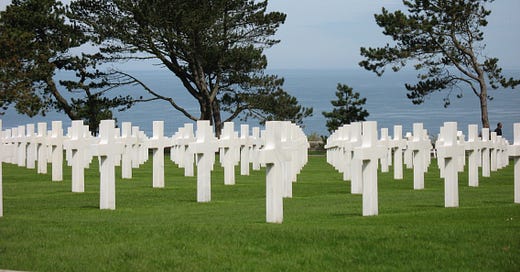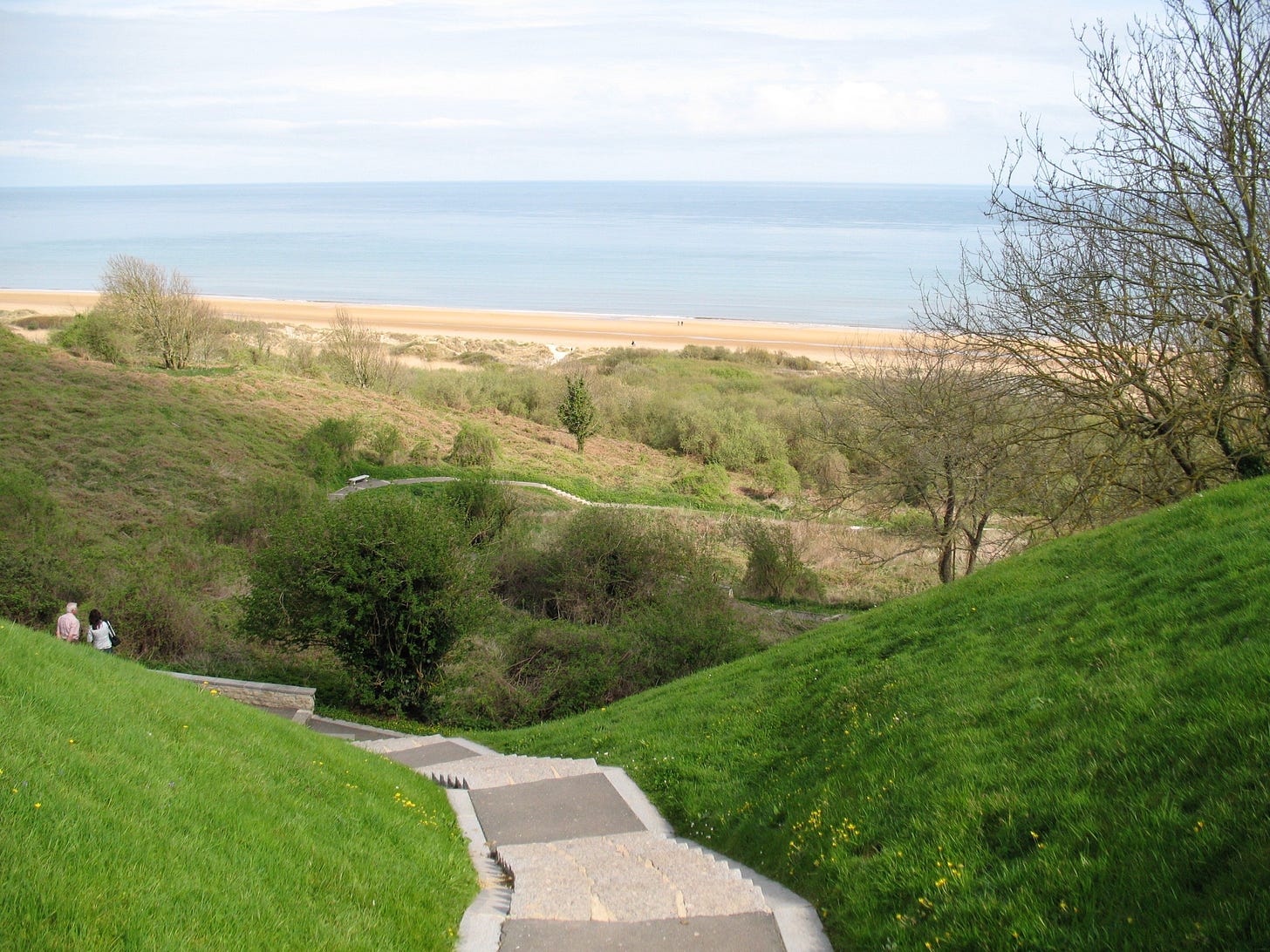If you hit “❤️ “the at the top or bottom of this email, you will make it easier for other people to find this publication + you will have my appreciation!
Until now, the most patriotic I have ever felt was not in this country. It wasn’t at a parade, or fireworks, or—God forbid—listening to the cannons go off at the end of the 1812 Overture.
I have generally found those experiences boozy, crowded, rowdy—and, worst of all, the parking is always bad.
The place where I felt this full-throated gulp, this skip-a-heartbeat, tears-in-my-eyes welling up of patriotism was in Colleville-sur-Mer, France.
We arrived in the village by way of Omaha Beach. Ever since I can remember, it had been a place I wanted to see. How could it not be? The images from The Longest Day, Saving Private Ryan, and Band of Brothers were seared into my memory.
Omaha Beach
I even had a father/son connection here: though twenty miles offshore, in relative safety, my father had been a 22-year-old sailor aboard a supply ship off Omaha Beach on June 6, 1944.
Omaha Beach was not a disappointment—but it was compromised. There was still a hallowedness to be found there, but for me, at least, I had to rely on imagination, on memory from movies. Just as the waves continue to wash against that shore, time has washed away some of its sacredness. The blood spilled has seeped so far into the sand that it has become part of the terrain. Where German pillboxes once dotted the heights above the beach, there are now vacation condos.
The bluffs overlooking Omaha Beach are a steep climb, though there are boardwalks to ease the ascent. We arrived at the top, winded, crossed a small lane—and then we were there.
The American Cemetery.
If you haven’t been, trust me: nothing can prepare you for what you will see. And if you have, then you know exactly what I mean.
At first, it is like a vision, a mirage: a sea of white crosses fading into infinity on a background as green as anything you might see in Ireland. Before your eyes can even adjust to this sight, the sanctuary offers up its most otherworldly quality: complete silence—except for birdsong. Silence so deep it feels like you, too, are sinking into the earth.
As you walk among the rows of crosses, two long-forgotten grammar school skills return: mental arithmetic and geography. There are no birth dates—only names, ranks, units, home states, and dates of death. So you do the imaginary math, with probable birth years. 1944 minus 1921, 1918, 1924... and you get: 23, 26, 20, even 19 years of age. Nineteen! And places you’ve heard of but never seen: Joplin, Missouri; Blue Ridge, Georgia; Julian, California; Bangor, Maine. The ages—almost all early twenties—and the hometowns—almost all unfamiliar—go on for row after row after row.
Imagine being on a landing craft.
I tried to imagine what those buried here must have felt as they left the relative safety of the ships, boarded the landing craft, and slammed over the waves toward a blizzard of bullets: the paralyzing fear, the yearning for home and family, the futile hope that they might be the one to survive.
I am not trying to valorize war. Quite the opposite. Anyone buried here experienced carnage (from the Latin: caro, flesh), blood, severed limbs, slaughter, and bowel-evacuating terror. Anyone who survived carried that trauma for the rest of their lives.
America is not the only country founded on an idea—Israel and the Soviet Union also began as ideas. America is not the only country built by immigrants—so were Australia and Canada.
But we are, by far, the largest country ever founded on an idea and built by immigrants.
No other country comes close.
The idea—that all men (sic) are created equal and endowed with unalienable rights: life, liberty, and the pursuit of happiness; and that governments derive their just powers from the consent of the governed—has always been flawed in execution and riddled with paradox.
But nevertheless, despite all the flaws and failures, the cruelty and the crassness, this idea remains revolutionary. And painful as it has been, generations of clear-eyed moralists, reluctant prophets, and brave truth-tellers have scratched and clawed and struggled and bled to make this idea “more perfect.”
The paradox.
The paradox at the heart of the American idea—the one all those striving for a more perfect union eventually confront—is this: the tension between the individual and the commonwealth. It’s right there in the Declaration of Independence. Its opening lines, “life, liberty, and the pursuit of happiness,” are directed at the individual; its closing lines, “we mutually pledge to each other our lives, our fortunes, and our sacred honor,” are directed at the community.
This American Exceptionalism.
This is the American exceptionalism I fully embrace: not the chest-thumping kind, but the revolutionary idea of mutually pledging our belief in the right of all people to life, liberty, and the pursuit of happiness.
But—as it seems to happen cyclically—venal, corrupt, mendacious, dishonest, and treacherous people have wormed their way into positions of power.
Just look:
Donald Trump in his gold-plated Oval Office; Pam Bondi, Qatar lobbyist at $100K a month, ruling that bribes from Qatar are perfectly fine; Katherine Leavitt’s mind-numbing ignorance of basic facts; Kristi Noem’s pornography of punishment; J.D. Vance’s delusional, arcane Catholicism; Linda McMahon, the Secretary of Education who cannot spell; the venomous Elon Musk...
I could go on, but you get the point.
It is these people—and those like them—who are a threat to American exceptionalism: the exceptional idea that a country built by immigrants can strive toward equality, ensure personal freedom, and mutually create community.
There is no way to calculate how many of the hallowed dead at the American Cemetery were immigrants. But it is likely—very likely— that a good percentage of them, if not actual immigrants, were first and second generation sons (and daughters) of immigrants. And it was their blood that kept the idea of American exceptionalism (NOT America First) alive.
I hope none of the gaudiest, vulgar, immoral, unethical, unqualified, bought-off administration in the history of this country EVER set foot in the American Cemetery at Colleville-sur-Mer.
We will honor those soldiers in a few short days. And know that they stand for everything that is good about America.
Simply writing these words makes me feel patriotic.
Thanks for reading.
I’ve been going through some old letters.
What a strange form of communication it now seems. The time it took to put pen to paper! The time it took to recount events, express thoughts.
It also struck me that I have no idea where many (most) of these “letter-writers” are, whether they are still alive, whether they have/had happy lives.
It led to this, which sort of came out as a show tune.
🔔 Enjoyed this? If this stirred something in you (existential dread, recognition, the urge to throw your phone into a river), consider subscribing — it’s free, and it helps me keep writing through the noise.










I really needed that piano piece, just to soothe my soul today. Thank you John.
Small town Memorial Day parades that wind through cemeteries with students earnestly reciting the Gettysburg Address can also echo vulnerability and patriotism for me.